|
__________________________________________________________________
Making Child Care More Affordable for Working Families

Affordable and accessible child care is one of the most pressing needs for working families in Maine and across the nation. Right now, Maine's child care shortage is estimated to be costing our economy hundreds of millions of dollars and families are feeling the weight of rising costs. When families have access to care, they are able to succeed both at home and in their professional careers, but rising costs and a workforce shortage have made accessing and affording care that much more difficult.
So, to help with affordability and address the workforce shortage, I teamed up with my colleague Senator Jeanne Shaheen (D-NH) to introduce the Right Start Child Care and Education Act. This legislation would help cut care costs by increasing the amount of tax-free money Maine families can save through dedicated flexible spending accounts. It would also expand employer-provided and small business child care credits. And, to address the workforce shortage, this bill would create a new tax credit for child care professionals with college degrees. It's a win-win for Maine families.
This legislation will help lessen the burden and set our families, workforce and economy up for success. Child care is more than a household priority; child care means business for our state.
Learn more about how this bill will help Maine working families here.
Combatting Health Care Cyber Attacks

Reports have shown a huge rise in cybersecurity attacks against healthcare systems across the country. Cyberattacks to health care infrastructure cost money, threaten privacy and, most dangerously, put lives at risk. And, in recent weeks, one of Maine's major health care providers was the victim of a cyberattack, as was the MaineCare pharmacy claims system.
So, to combat these threats and keep Maine people and health providers safe, I joined Senator Marco Rubio (R-FL) to introduce the bipartisan Strengthening Cybersecurity in Health Act. This legislation would require the Department of Health and Human Services (HHS) to evaluate the cybersecurity practices of health care systems, as well as provide biennial reports on the work being done to implement future safety practices.
As the threats continue to increase, being proactive will prove to be one of the greatest tools in our toolbox.
Learn more about how we're working to protect against cyberattacks here.
Happenings Around Town
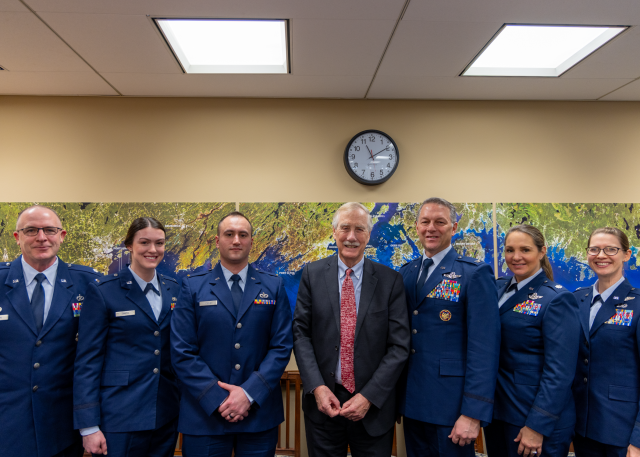
Meeting with the famous 101st Maineiacs during their trip to Washington, D.C.
Bangor's 101st is one of the most recognized and dedicated National Guard units. I had the privilege to sit down with the incredible Maineiacs to discuss their contributions to global security, recruiting, 3-D printing capabilities and to reaffirm my support for their mission.
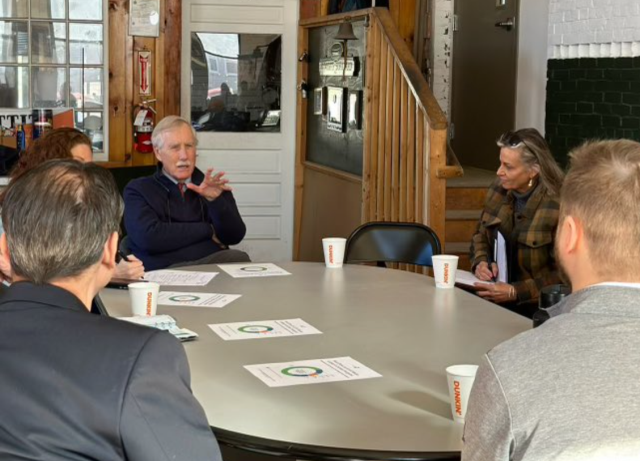
Visiting Rumery Boatyard to celebrate its USDA grant award to install solar panels
Maine innovation is at the forefront of a clean energy future and rural development investments are critical to driving us closer toward that goal. I had a great time celebrating Rumery Boatyard's USDA award that will help the boatyard develop solar panels — meeting more than 90% of its energy needs!
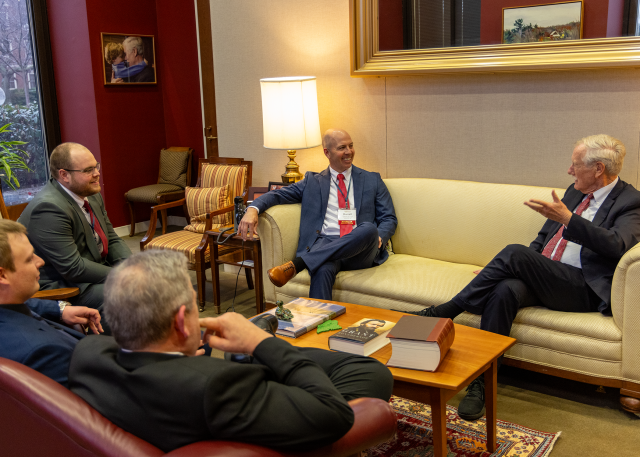
Discussing trends in the potato industry with the Maine Potato Board
Maine has a heritage of high quality, delicious potatoes that runs deep and feeds families across the country. I was excited to welcome the Maine Potato Board to Washington, D.C. earlier this week, where we discussed this past season's harvest, sustainable irrigation techniques, agricultural trade and more.
February Policy Update
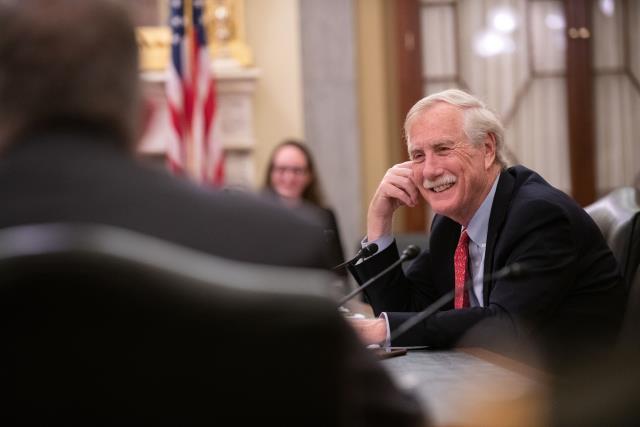
As a reminder, you can read more on my regularly updated press release page at king.senate.gov. Here are some other priorities I’ve been working on:
- Protecting Kids Online. Far too many children in Maine and across the nation face risks when online. We need to ensure our laws keep up with rapidly evolving technology and a more online generation. To help do this, I joined a bipartisan group of my colleagues in cosponsoring the Kids Online Safety Act, legislation that will provide families with better tools to protect minors online, hold Big Tech accountable and provide transparency into online algorithms. Read more HERE.
- Breaking Through the Traffic Jam of Information. We've all seen the clever highway signs telling us to "Click it or Ticket" or "Drive Sober or Get Pulled Over." Recently, the Department of Transportation (DOT) issued new guidelines that restrict these roadside puns. I wrote to the DOT urging them to rethink these restrictions and prioritize on the back up of traffic safety issues such as districted or impaired driving. Read more HERE.
- Fighting the Homework Gap. With learning now extending beyond the physical walls of a school, reliable WiFi is a critical education tool. To ensure the success of all our Maine students, I wrote to the Federal Communications Commission (FCC) asking them to expand the existing E-Rate program that helps schools and libraries obtain and loan out affordable WiFi hotspots. Read more HERE.
- Lowering Prescription Drug Costs. Rising prescription drug prices are preventing people in Maine and across the nation from accessing treatments they need. To address this critical issue, I led a group of my colleagues in urging the Biden Administration to finalize guidance to lower prescription drug cost and save taxpayer dollars. Read more HERE.
- Protecting Maine's Drinking Water. Maine communities relying on wells for drinking water have to be extra cautious when dealing with hard or toxic chemicals like PFAS. Alongside Senator Collins, I introduced legislation that would provide states more flexibility when helping to mitigate PFAS contamination in private wells. Read more HERE.
- Connecting Veterans with State Assistance. Currently, servicemembers are required to fill out a pre-separation form during their transition to civilian life. However, complicated wording in the form means many veterans do not get connected with the resources and help they need. Alongside Senator Cramer, a Republican from North Dakota, I wrote a letter to the Department of Defense (DOD) and Department of Veterans' Affairs (VA) asking them to make a small change in the wording so more veterans can access resources during their transition period. Read more HERE.
- Simplifying the FAFSA. The Free Application for Federal Student Aid (FAFSA) helps lessen the financial burden for so many students seeking a higher education. But recent delays and glitches with the new FAFSA form have raised concerns some students might be left out of the process entirely. Alongside my colleagues, I wrote to the Department of Education (DOE) urging them to quickly address these issues and ensure students across Maine and the country have access to an affordable education. Read more HERE.
Hearing Highlights
This month, in a Senate Armed Services Committee (SASC) hearing, I addressed U.S. Navy Admiral Samuel Paparo Jr., the nominee to be Commander of the U.S. Indo-Pacific Command, on the possible ramifications of U.S. deterrence efforts against China if we turn our backs on Ukraine.
Also this month, in a Senate Veterans' Affairs Committee (SVAC) hearing, I questioned Michael Fisher, the Chief Officer of Readjustment Counseling Service in the Veterans Health Administration about what the Department is doing to address its slow approval process and how the workforce shortages at Vet Centers are creating unnecessary barriers for veterans seeking health care.
In The News
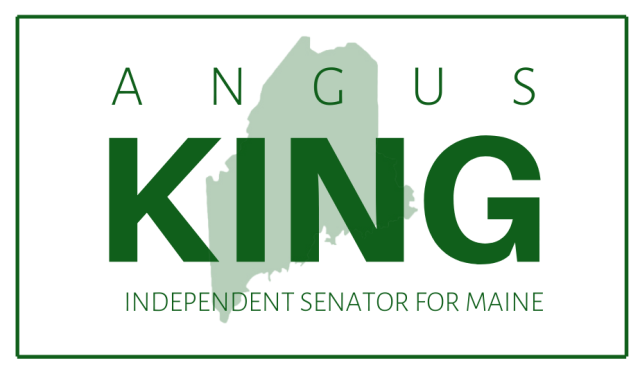
Thanks for subscribing to my monthly newsletter! I would love to hear your ideas for how we can make Maine and our country a better place. Please feel free to reach out with any questions, comments or concerns by visiting: https://www.king.senate.gov/contact – we look forward to hearing from you.
All the best!

To unsubscribe to this e-Newsletter click HERE.
|